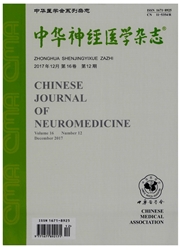

 中文摘要:
中文摘要:
目的探讨网络成瘾对青少年注意功能的影响。方法对符合网络成瘾诊断标准的青少年和无网络成瘾倾向的青少年各18例分别进行有关注意功能的神经心理学测评.对比了解网络成瘾组注意功能损害程度;利用听觉和视觉Oddball范式,刺激包括标准刺激、靶刺激和新异刺激,采集脑电后分析网络成瘾组和对照组对新异刺激和靶刺激所产生的P3a,P3b的差异。结果网络成瘾组与对照组相比,神经心理学测评中出现明显的注意功能下降.事件相关电位检测中对新异刺激(计算机开机声音和画面)所形成的P3a的潜伏期缩短,波幅升高,而对靶刺激所形成的P3b的潜伏期延长、波幅下降。结论网络成瘾造成青少年注意功能下降,与P300变化具有一定的相关性。
 英文摘要:
英文摘要:
Objective To explore the effect of Internet addiction on adolescent's attention. Methods Neuropsychological evaluations of attention function were done separately in 18 adolescents who met the diagnostic criterion for Internet addiction and in other 18 ones without Internet addition tendency as a control group. With auditory and visual oddball paradigms, and stimulated by standard, target and novel stimuli, EEG was recorded and analyzed to get the event-related potential P300 and compare the latency and amplitude of P3a and P3b between the 2 groups. Results Compared with the controls, the attention of Internet addiction group was decreased significantly in neuropsychological evaluations. The latency of P3a potentials induced by novel stimulus was much shorter and the amplitude of it was higher in addiction group than in control group, but the latency of P3b potentials generated by target stimulus was prolonged and the amplitude decreased obviously. Conclusions Internet addiction can cause damage to adolescent's attention function, There is a correlation between the attention impairment and the change of P300 potentials
 同期刊论文项目
同期刊论文项目
 同项目期刊论文
同项目期刊论文
 期刊信息
期刊信息
